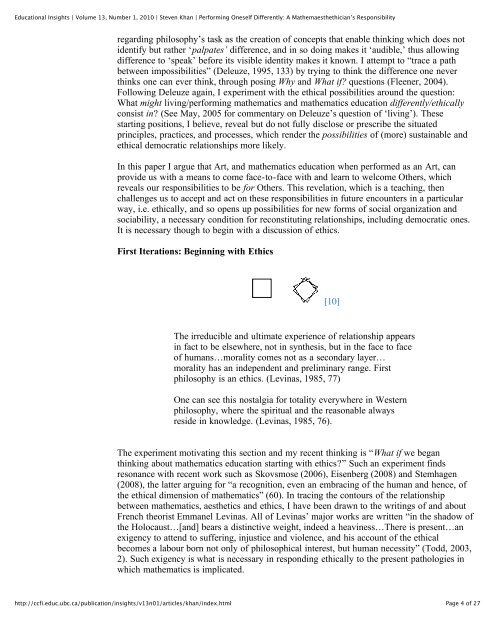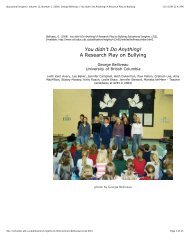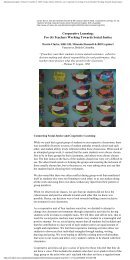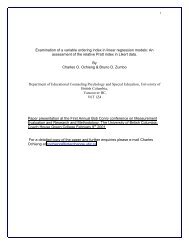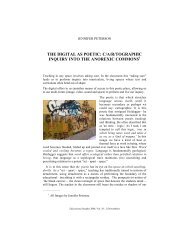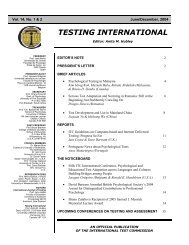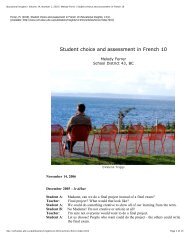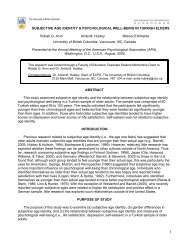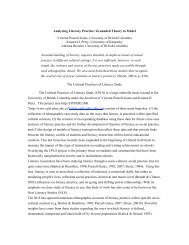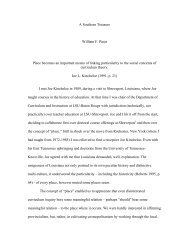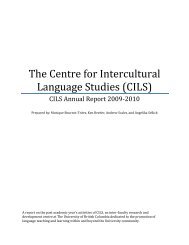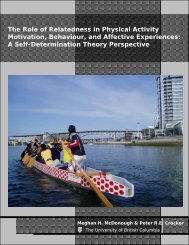Printer Version - University of British Columbia
Printer Version - University of British Columbia
Printer Version - University of British Columbia
You also want an ePaper? Increase the reach of your titles
YUMPU automatically turns print PDFs into web optimized ePapers that Google loves.
Educational Insights | Volume 13, Number 1, 2010 | Steven Khan | Performing Oneself Differently: A Mathemaesthethician’s Responsibility<br />
regarding philosophy’s task as the creation <strong>of</strong> concepts that enable thinking which does not<br />
identify but rather ‘palpates’ difference, and in so doing makes it ‘audible,’ thus allowing<br />
difference to ‘speak’ before its visible identity makes it known. I attempt to “trace a path<br />
between impossibilities” (Deleuze, 1995, 133) by trying to think the difference one never<br />
thinks one can ever think, through posing Why and What if? questions (Fleener, 2004).<br />
Following Deleuze again, I experiment with the ethical possibilities around the question:<br />
What might living/performing mathematics and mathematics education differently/ethically<br />
consist in? (See May, 2005 for commentary on Deleuze’s question <strong>of</strong> ‘living’). These<br />
starting positions, I believe, reveal but do not fully disclose or prescribe the situated<br />
principles, practices, and processes, which render the possibilities <strong>of</strong> (more) sustainable and<br />
ethical democratic relationships more likely.<br />
In this paper I argue that Art, and mathematics education when performed as an Art, can<br />
provide us with a means to come face-to-face with and learn to welcome Others, which<br />
reveals our responsibilities to be for Others. This revelation, which is a teaching, then<br />
challenges us to accept and act on these responsibilities in future encounters in a particular<br />
way, i.e. ethically, and so opens up possibilities for new forms <strong>of</strong> social organization and<br />
sociability, a necessary condition for reconstituting relationships, including democratic ones.<br />
It is necessary though to begin with a discussion <strong>of</strong> ethics.<br />
First Iterations: Beginning with Ethics<br />
http://ccfi.educ.ubc.ca/publication/insights/v13n01/articles/khan/index.html<br />
[10]<br />
The irreducible and ultimate experience <strong>of</strong> relationship appears<br />
in fact to be elsewhere, not in synthesis, but in the face to face<br />
<strong>of</strong> humans…morality comes not as a secondary layer…<br />
morality has an independent and preliminary range. First<br />
philosophy is an ethics. (Levinas, 1985, 77)<br />
One can see this nostalgia for totality everywhere in Western<br />
philosophy, where the spiritual and the reasonable always<br />
reside in knowledge. (Levinas, 1985, 76).<br />
The experiment motivating this section and my recent thinking is “What if we began<br />
thinking about mathematics education starting with ethics?” Such an experiment finds<br />
resonance with recent work such as Skovsmose (2006), Eisenberg (2008) and Stemhagen<br />
(2008), the latter arguing for “a recognition, even an embracing <strong>of</strong> the human and hence, <strong>of</strong><br />
the ethical dimension <strong>of</strong> mathematics” (60). In tracing the contours <strong>of</strong> the relationship<br />
between mathematics, aesthetics and ethics, I have been drawn to the writings <strong>of</strong> and about<br />
French theorist Emmanel Levinas. All <strong>of</strong> Levinas’ major works are written “in the shadow <strong>of</strong><br />
the Holocaust…[and] bears a distinctive weight, indeed a heaviness…There is present…an<br />
exigency to attend to suffering, injustice and violence, and his account <strong>of</strong> the ethical<br />
becomes a labour born not only <strong>of</strong> philosophical interest, but human necessity” (Todd, 2003,<br />
2). Such exigency is what is necessary in responding ethically to the present pathologies in<br />
which mathematics is implicated.<br />
Page 4 <strong>of</strong> 27


